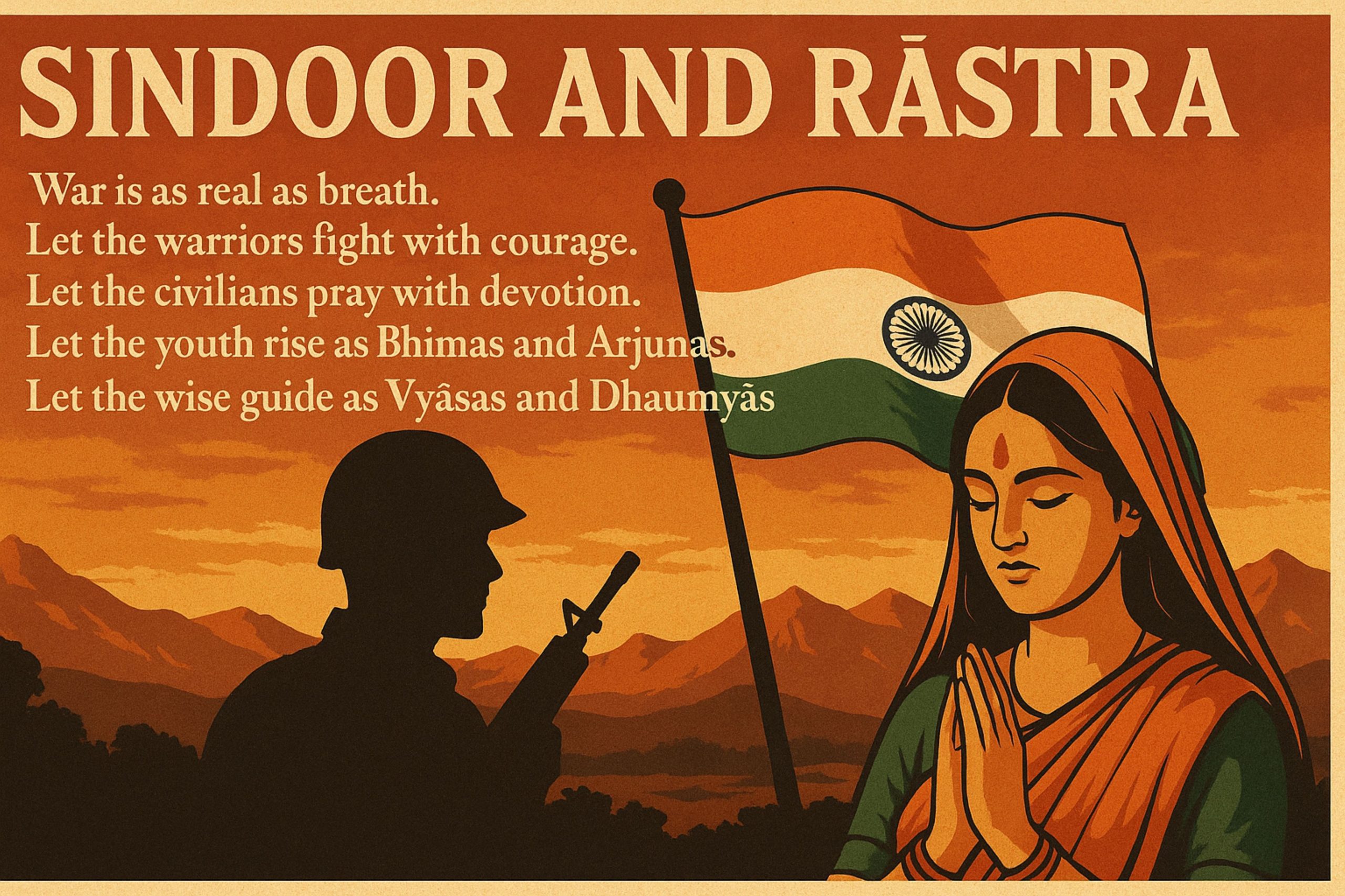
War is as real as breath — brutal, inevitable, and shaping. Peace is what we long for, but war is what we must survive. In the history of mankind, peace is the exception — war, the grim constant. It is not war that defines cruelty, but how we meet it — whether in cowardice or in courage.
𝘽𝙝𝙖𝙧𝙖𝙩𝙖 — this sacred land — has faced countless storms, invaders from within and without. She has bent, she has bled, but never broken. This is no ordinary nation, stitched by lines on a map. This is Rashtra — a living, breathing Punya Bhumi sanctified by rivers, mountains, sages, and sacrifice.
Those who scoff at nationhood from gated colonies and ivory towers, those who reject the idea of Rashtra while living in meticulously structured societies, are blind to their own hypocrisy. For what is a nation, if not the grandest structure of human civilization? A Dharma-Kshetra where each generation preserves, protects, and passes on the legacy of culture and truth.
𝙇𝙚𝙩 𝙩𝙝𝙚 𝙙𝙤𝙪𝙗𝙩𝙚𝙧𝙨 𝙝𝙚𝙖𝙧 𝙩𝙝𝙚 𝙫𝙤𝙞𝙘𝙚 𝙤𝙛 𝙤𝙪𝙧 𝙨𝙘𝙧𝙞𝙥𝙩𝙪𝙧𝙚𝙨:
𝘚𝘳𝘪𝘮𝘢𝘥 𝘉𝘩𝘢𝘨𝘢𝘷𝘢𝘵𝘢𝘮 𝘴𝘱𝘦𝘢𝘬𝘴 𝘰𝘧 𝘉𝘩𝘢𝘳𝘢𝘵𝘢 𝘝𝘢𝘳𝘴𝘩𝘢 𝘯𝘰𝘵 𝘫𝘶𝘴𝘵 𝘢𝘴 𝘢 𝘱𝘭𝘢𝘤𝘦 𝘰𝘯 𝘌𝘢𝘳𝘵𝘩, 𝘣𝘶𝘵 𝘢𝘴 𝘢 𝘭𝘢𝘯𝘥 𝘴𝘢𝘯𝘤𝘵𝘪𝘧𝘪𝘦𝘥 𝘣𝘺 𝘵𝘩𝘦 𝘵𝘰𝘶𝘤𝘩 𝘰𝘧 𝘵𝘩𝘦 𝘴𝘢𝘤𝘳𝘦𝘥:
“Two of the rivers-the Brahmaputra and the Sona-are called nadas, or main rivers. These are other great rivers that are very prominent –
Candravasa, Tamraparni, Avatoda, Krtamala, Vaihayasi, Kaveri, Veni, Payasvini, Sarkaravarta, Tungabhadra, Krsnavenya, Bhimarathi, Godavari, Nirvindhya, Payosni, Tapi, Reva, Surasa, Narmada, Carmanvati, Mahãnadi, Vedasmrti, Rsikulyā, Trisama, Kausiki, Mandakini, Yamuna, Sarasvati, Drsadvati, Gomati, Sarayu, Rodhasvati, Saptavati, Susoma, Satadü, Candrabhaga, Marudyrdha, Vitasta, Asikni and Visa. The inhabitants of Bharata-varsa are purified because they always remember these rivers. Sometimes they chant the names of these rivers as mantras, and sometimes they go directly to the rivers to touch them and bathe in them. Thus the inhabitants of Bhãrata varsa become purified. “(𝙎𝙧𝙞𝙢𝙖𝙙 𝘽𝙝𝙖𝙜𝙖𝙫𝙖𝙩𝙖𝙢 𝟱.𝟭𝟵.𝟭𝟳-𝟭𝟴 )
In the tract of land known as Bharata-varsa, as in Ilavrta-varsa, there are many mountains and rivers. Some of the mountains are known as Malaya, Mangala-prastha, Mainäka, Triküta, Rsabha, Kutaka, Kollaka, Sahya, Devagiri, Rsyamuka, Sri-saila, Venkata, Mahendra, Varidhara, Vindhya, Suktiman, Rksagiri, Pariyatra, Drona, Citraküta, Govardhana, Raivataka, Kakubha, Nila, Gokamukha, Indrakila and Kamagiri. Besides these, there are many other hills, with many large and small rivers flowing from their slopes. ( 𝙎𝙧𝙞𝙢𝙖𝙙 𝘽𝙝𝙖𝙜𝙖𝙫𝙖𝙩𝙖𝙢 𝟱.𝟭𝟵.𝟭𝟲 )
The Country which lies to the north of the seas and to the south of Himalayas, is Bharat, and the people of this Country are ‘Bharatiyas’. The other seven main chains of Mountains in Bharata Varsha are, Mahendra, Malaya, Sahya, Suktimat, Riksha, Vindhya and Paripatra.
( 𝙑𝙞𝙨𝙝𝙣𝙪 𝙋𝙪𝙧𝙖𝙣𝙖 𝟮.𝟯 )
The country which is created by God, which lies between the two sacred rivers, Saraswathi and Drishadvati, is called Brahmavarta. Kurukshetra, Matsya, Panchala and Shurasena are the regions which go by the name of Brahmarshi Desha.
The country to the north of which lie the Himalaya mountains, and to the South of which are the Vindhya Mountains and to the east of which there is an area called Vinashana in which area the river Saraswati is hidden and to the West of which is Prayag, is called Madhya Desha. The area which is surrounded by the sea in the east and in which the mountain ranges are located, is called Aryavartha. ( 𝙈𝙖𝙣𝙪 𝙎𝙖𝙢𝙝𝙞𝙩𝙖 )
These are no mythic landscapes — they are the arteries of our culture, pulsing with the lifeblood of Dharma. Mountains like Sahya, Vindhya, and Mahendra rise as sentinels, timeless and unyielding. Rivers like Sarasvati, Yamuna, and Godavari flow with memory — sanctifying all who approach with reverence.
This is the land where sages walked, where knowledge blossomed, and where even the gods gaze with longing. This is not nationalism twisted into hatred — this is spiritual stewardship. A sacred duty to uphold the culture, the Dharma, and the enduring truth of Bharata.
𝙎𝙧𝙞𝙢𝙖𝙙 𝘽𝙝𝙖𝙜𝙖𝙫𝙖𝙩𝙖𝙢 ( 𝟱.𝟭𝟵.𝟮𝟯 ) 𝘦𝘷𝘦𝘯 𝘱𝘳𝘰𝘤𝘭𝘢𝘪𝘮𝘴:
“Better to live for a short time in Bharata-varsha than to rule in Brahmaloka for millions of years, for here one can attain the Supreme Perfection — by surrender to Sri Hari.”
𝘚𝘰 𝘵𝘩𝘦 𝘤𝘰𝘯𝘧𝘭𝘪𝘤𝘵 — 𝘸𝘩𝘢𝘵𝘦𝘷𝘦𝘳 𝘧𝘰𝘳𝘮 𝘪𝘵 𝘵𝘢𝘬𝘦𝘴 — 𝘪𝘴 𝘯𝘰𝘵 𝘮𝘦𝘳𝘦𝘭𝘺 𝘵𝘦𝘳𝘳𝘪𝘵𝘰𝘳𝘪𝘢𝘭. 𝘐𝘵 𝘪𝘴 𝘴𝘱𝘪𝘳𝘪𝘵𝘶𝘢𝘭. 𝘐𝘵 𝘪𝘴 𝘦𝘹𝘪𝘴𝘵𝘦𝘯𝘵𝘪𝘢𝘭. 𝘐𝘵 𝘪𝘴 𝘢 𝘣𝘢𝘵𝘵𝘭𝘦 𝘧𝘰𝘳 𝘪𝘥𝘦𝘯𝘵𝘪𝘵𝘺, 𝘧𝘰𝘳 𝘋𝘩𝘢𝘳𝘮𝘢, 𝘧𝘰𝘳 𝘵𝘩𝘦 𝘷𝘦𝘳𝘺 𝘴𝘰𝘶𝘭 𝘰𝘧 𝘵𝘩𝘪𝘴 𝘢𝘯𝘤𝘪𝘦𝘯𝘵 𝘤𝘪𝘷𝘪𝘭𝘪𝘻𝘢𝘵𝘪𝘰𝘯. 𝘈𝘯𝘥 𝘪𝘯 𝘴𝘶𝘤𝘩 𝘢 𝘣𝘢𝘵𝘵𝘭𝘦, 𝘯𝘦𝘶𝘵𝘳𝘢𝘭𝘪𝘵𝘺 𝘪𝘴 𝘤𝘰𝘮𝘱𝘭𝘪𝘤𝘪𝘵𝘺. 𝘚𝘪𝘭𝘦𝘯𝘤𝘦 𝘪𝘴 𝘴𝘶𝘳𝘳𝘦𝘯𝘥𝘦𝘳.
𝘓𝘪𝘬𝘦 𝘈𝘳𝘫𝘶𝘯𝘢, 𝘴𝘰𝘮𝘦 𝘮𝘢𝘺 𝘩𝘦𝘴𝘪𝘵𝘢𝘵𝘦. 𝘉𝘶𝘵 𝘚𝘳𝘪 𝘒𝘳𝘪𝘴𝘩𝘯𝘢’𝘴 𝘤𝘢𝘭𝘭, 𝘴𝘵𝘪𝘭𝘭 𝘦𝘤𝘩𝘰𝘦𝘴:
𝙔𝙪𝙙𝙙𝙝𝙖𝙘𝙝𝙖 — 𝙁𝙞𝙜𝙝𝙩 !!
𝘕𝘰𝘵 𝘪𝘯 𝘣𝘭𝘪𝘯𝘥 𝘢𝘨𝘨𝘳𝘦𝘴𝘴𝘪𝘰𝘯, 𝘣𝘶𝘵 𝘪𝘯 𝘳𝘪𝘨𝘩𝘵𝘦𝘰𝘶𝘴 𝘥𝘦𝘧𝘦𝘯𝘴𝘦. 𝘕𝘰𝘵 𝘪𝘯 𝘩𝘢𝘵𝘦, 𝘣𝘶𝘵 𝘪𝘯 𝘥𝘩𝘢𝘳𝘮𝘢.
“𝙇𝙚𝙩 𝙩𝙝𝙚 𝙬𝙖𝙧𝙧𝙞𝙤𝙧𝙨 𝙛𝙞𝙜𝙝𝙩 𝙬𝙞𝙩𝙝 𝙘𝙤𝙪𝙧𝙖𝙜𝙚. 𝙇𝙚𝙩 𝙩𝙝𝙚 𝙘𝙞𝙫𝙞𝙡𝙞𝙖𝙣𝙨 𝙥𝙧𝙖𝙮 𝙬𝙞𝙩𝙝 𝙙𝙚𝙫𝙤𝙩𝙞𝙤𝙣. 𝙇𝙚𝙩 𝙩𝙝𝙚 𝙮𝙤𝙪𝙩𝙝 𝙧𝙞𝙨𝙚 𝙖𝙨 𝘽𝙝𝙞𝙢𝙖𝙨 𝙖𝙣𝙙 𝘼𝙧𝙟𝙪𝙣𝙖𝙨. 𝙇𝙚𝙩 𝙩𝙝𝙚 𝙬𝙞𝙨𝙚 𝙜𝙪𝙞𝙙𝙚 𝙖𝙨 𝙑𝙮𝙖𝙨𝙖𝙨 𝙖𝙣𝙙 𝘿𝙝𝙖𝙪𝙢𝙮𝙖𝙨.”
Let all of us remember 𝘚𝘳𝘪 𝘕𝘢𝘳𝘢𝘴𝘪𝘮𝘩𝘢 𝘋𝘦𝘷 on His Jayanti, and beg of Him:
Grant us fearlessness.Grant us strength. Grant us unity.
Let this land of diverse tongues, customs, and paths never forget its unified soul —𝙩𝙝𝙚 𝙨𝙥𝙞𝙧𝙞𝙩 𝙤𝙛 𝘽𝙝𝙖𝙧𝙖𝙩𝙖.
𝙏𝙝𝙞𝙨 𝙞𝙨 𝙣𝙤𝙩 𝙖 𝙘𝙖𝙡𝙡 𝙩𝙤 𝙫𝙞𝙤𝙡𝙚𝙣𝙘𝙚. 𝙏𝙝𝙞𝙨 𝙞𝙨 𝙖 𝙘𝙖𝙡𝙡 𝙩𝙤 𝙫𝙞𝙜𝙞𝙡𝙖𝙣𝙘𝙚.
𝘈 𝘤𝘢𝘭𝘭 𝘵𝘰 𝘴𝘦𝘳𝘷𝘪𝘤𝘦, 𝘢 𝘤𝘢𝘭𝘭 𝘵𝘰 𝘳𝘦𝘮𝘦𝘮𝘣𝘦𝘳:
𝙈𝙖𝙢 𝘼𝙣𝙪𝙨𝙢𝙖𝙧𝙖 𝙔𝙪𝙙𝙙𝙝𝙖𝙘𝙝𝙖 — 𝘙𝘦𝘮𝘦𝘮𝘣𝘦𝘳 𝘔𝘦 𝘢𝘯𝘥 𝘍𝘪𝘨𝘩𝘵.
– Govinda Das (ISKCON Member)


